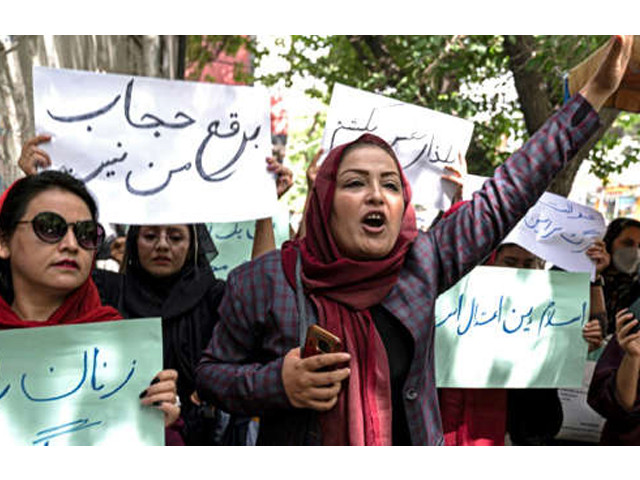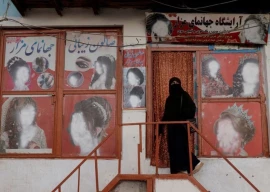
Afghan sisters Tamana and Zarmina Paryani admit that they harbour little illusion about what their 12-day-long hunger strike in western Germany could bring against the Taliban government, but for them, staying silent is not an option.
"I think what we would have achieved from this protest is not staying silent against the crimes of this group," Tamana told AFP.
Tamana, 25, had been among women who had taken part in protests in Afghanistan before being rounded up in a series of night raids on January 19, 2022.
Footage of her ordeal shortly before being taken had circulated on social media, showing her in distress, warning of the Taliban authorities at her door.
Tamana believes that the video brought awareness to her plight.
Following their release from prison, she and her three sisters decided to flee, arriving in Germany in October 2022.
Even though they are now hundreds of miles away from harm's way, the sisters are determined to keep raising their voices against the Taliban.
From a small tent at the small square in the town centre of Cologne, the sisters began their hunger strike, due to end on Tuesday, to raise awareness about "gender apartheid" in Afghanistan.
Even if Germany and other Western governments have condemned the Taliban for discriminating against women, the sisters believe they needed to continue their protest for concrete change.
Read also: France evacuates five Afghan women from Pakistan
"Because in the past two years, the world knows what is happening in Afghanistan, but in these two years the voice of the oppressed people of Afghanistan has not been heard," Zarmina said.
"Maybe it won't be heard in these 12 days as well," she added, but vowed to keep raising her voice.
"Afghanistan women are deprived of their basic human rights, only because they are women. In Afghanistan, a total gender apartheid government is ruling, and we want to end that."
In the time since their return to power in August 2021, Taliban authorities have imposed their strict interpretation of Islam, with women bearing the brunt of laws the United Nations has termed "gender apartheid".
Under those rules, women have found themselves largely excluded from public spaces, employment and education.
"The gender apartheid which exists in Afghanistan must be recognised," Tamana said.
"We want the German government and the UN to recognise the gender apartheid, and stand against it."
The UN has already labelled the situation in Afghanistan under the Taliban as "gender-based apartheid", but the term is not currently recognised under the Rome Statute among the worst international crimes.
Read: OIC delegation urges Taliban to ensure education for women
In June, the UN's top expert on rights in Afghanistan urged countries to consider making "gender apartheid" an international crime, a move that could help hold the Taliban accountable for its grave and systematic abuses against Afghan women.
Zarmina underlined that women in Afghanistan are "totally removed from society, they are not even allowed to go to parks, ... or gyms, and they are deprived of education."
After a period of staying "hidden" after her release from prison in Afghanistan, Tamana and her sisters decided to leave the country.
"I got out from there, and came here to be the voice of the sacrificed people in Afghanistan," Zarmina said.
Tamana said she is now starting to learn German.
"I'd love to get an education in Germany," she said, underlining the need for the youth of her country to go to school.
Despite her experience in Afghanistan, she hopes to be able to return one day.
"It's my motherland... I have experienced the good and bad, but obviously, I want to return and might work there."
1672385156-0/Andrew-Tate-(1)1672385156-0-405x300.webp)




















COMMENTS
Comments are moderated and generally will be posted if they are on-topic and not abusive.
For more information, please see our Comments FAQ